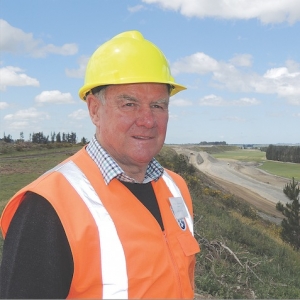IF YOU wondered why Canterbury’s Central Plains Water has been back in the news in the past few days, it’s because the 60,000ha irrigation company held a media morning last week to showcase work on its first stage.
Introducing the day CPW chief executive Derek Crombie opened with the environmental positives, explaining how water from the Rakaia would help recharge lowland streams and restore Lake Ellesmere / Te Waihora to health.
“The reason for the scheme is that most of this area is using groundwater for irrigation,” he told the posse of TV, radio and print journalists gathered for the jaunt.
“The amount of groundwater that can be taken is restricted and it is over-allocated and needs to be replaced for environmental reasons.”
Water taken from the Rakaia by canal will run across the top of the Canterbury Plain to feed a piped network running down to State Highway One delivering water at a minimum of 400kpa. As scheme chairman, Doug Catherwood later noted, that’s enough pressure “to drive all irrigation machinery” so there will be no pumping costs.
Nor are there pumping costs to get the water out of the river: from an in-river intake, the canal traverses the river’s terrace for 10km to reach the top and break northeast at about 235m above sea-level.
Stage one will initially water 20,000ha, though the potential is 23,000ha. Shareholders in that area have invested $1750/ha in shares to fund the construction and will face annual charges of $700/ha from next September when the scheme’s commissioned.
They will also need 12 water shares/ha which when issued were sold at $10/share, but now trade for $30/share, Catherwood told Dairy News.
Shareholders in the remaining 37,000ha will be approached during the next year for capital to fund extension of the canal across to Coalgate, Darfield, Kirwee and the Waimakariri. The aim’s to have that built by September 2019.
“It will take a year to get the canal past Coalgate.”
Shareholder equity in stage one is about 28%. That’s also the target for the whole scheme, leaving about $330m in borrowing which will be paid off over 35 years, says Catherwood.
In the stage one area some irrigators pump groundwater from 200m deep. Crombie says on average that costs them $800/ha/year in electricity so CPW will save them $100/year, or more as power prices rise. Replacing groundwater takes with river water will also help recharge aquifers, lowland streams, and in turn help restore Lake Ellesmere (Te Waihora).
Of the schemes 390 shareholders about quarter are dairy, says Catherwood.


















